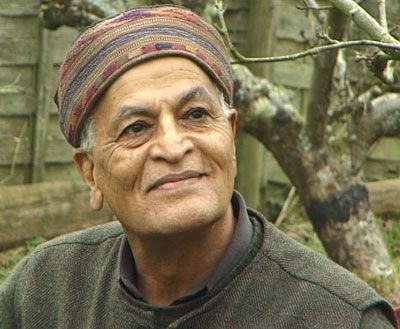Elder Voices of the Millennium: Satish Kumar – Pilgrim of Simplicity, Peace, and Planetary Wisdom
Maria Fonseca
Wed Jul 09 2025

The Elder Voices of the Millennium series honours those who carry an embodied memory, culture, and understanding of the past, and therefore present times, reminding us of the importance of reconnecting with and respecting voices that have shaped our past and continue to inspire our future.
Satish Kumar: A Life Walked in Gentle Power
There are people whose presence settles a room. Not through charisma or acclaim, but through something quieter—a kind of listening attention, a steadiness that comes from long inner work. Satish Kumar is such a presence. He has lived much of his life not in the spotlight, but as a guiding thread between worlds: spiritual and ecological, Eastern and Western, ancient and emerging.
Born in India in 1936, Kumar’s life has been shaped by service, simplicity, and a deep respect for the interconnectedness of all things. A former Jain monk, peace pilgrim, educator, and editor, his contributions over the last seven decades have been steady and far-reaching. His journey—both literal and philosophical—has inspired movements for peace, sustainable living, and ethical education across the globe.
From Monkhood to Movement
Satish Kumar’s formative years were spent in the discipline of Jainism, one of the world’s oldest spiritual traditions. At just nine years old, he chose to become a monk. Jain monks renounce all material possessions and live by an intense ethic of nonviolence (ahimsa) toward all life forms, including the smallest insects. It was a rigorous life, structured by daily practices of mindfulness and restraint—yet also one of profound clarity.
By the time he was eighteen, Kumar felt called to engage more actively with the suffering of the world. Inspired by Mahatma Gandhi and his disciple Vinoba Bhave, he left the monastery to walk a different kind of path: one that kept the spirit of ahimsa alive in action, community, and education.

A Pilgrimage for Peace
That path soon took literal shape. In the early 1960s, as Cold War tensions loomed and the threat of nuclear annihilation hung heavy, Kumar embarked on an audacious journey: a peace walk from India to the world’s four nuclear capitals—Moscow, Paris, London, and Washington, D.C.
Together with his companion E.P. Menon, Kumar walked over 8,000 miles without money, trusting in the kindness of strangers and the strength of their message. They carried a humble offering: packets of peace tea, to be gifted to world leaders as a symbol of nonviolent diplomacy.
What set this pilgrimage apart was its tone. It was not confrontational, but deeply human. Along the way, they met farmers, villagers, city dwellers, and border guards—sharing meals, conversations, and reflections. The journey reinforced Kumar’s belief that peace is not negotiated in boardrooms alone; it is built in everyday encounters, in the capacity to see the other not as an enemy, but as a fellow being.

Schumacher College and a New Education
In the decades that followed, Satish Kumar turned increasingly toward education—not as a formal system, but as a life practice. In 1991, he became a founding figure in Schumacher College, a progressive learning institution based in Devon, UK. The college was created as part of the Dartington Hall Trust, envisioned as a place where ecological wisdom, systems thinking, and personal transformation could be studied and lived in equal measure.
Kumar’s influence shaped not only the curriculum but the soul of the college. At Schumacher, students didn’t just sit in lectures—they cooked together, worked in the gardens, and engaged in dialogue across disciplines. The guiding philosophy was holistic: reconnecting knowledge with values, community, and the Earth.
Under Kumar’s stewardship, the college welcomed some of the world's most thoughtful minds: Vandana Shiva, James Lovelock, Joanna Macy, Fritjof Capra, and others. Yet his own role was never self-aggrandising. He taught by example—through listening, simplicity, and presence. Many students describe him not as a lecturer, but as a mentor who helped them reconnect with their deeper questions.
Rethinking Economics: From Scarcity to Sufficiency
In parallel to his educational work, Kumar has long been a leading voice in the movement for new economics—an economics grounded not in scarcity and profit, but in sufficiency and relationship.
As the long-time editor of Resurgence magazine (which became Resurgence & Ecologist), Kumar provided a platform for writers and thinkers exploring ecology, spirituality, arts, and justice. His editorship offered a counterpoint to mainstream narratives of growth and consumption, highlighting paths of community wealth, local resilience, and ethical consumption.
His 2019 book Elegant Simplicity distills these insights into a gentle manifesto. For Kumar, simplicity is not asceticism—it is liberation. It is a way of stepping out of the cycles of consumerism and returning to what truly nourishes us: land, relationships, shared purpose. In his words, “Simplicity is the prerequisite for sustainability. Without simplicity, sustainability is just a beautiful idea.”
Anchored in Place, Connected to the World
Since the 1990s, Satish Kumar has made his home near Dartington, in South Devon. The landscape—woodlands, rivers, community gardens—has become both setting and source of his ongoing work. And yet, his presence remains global. He continues to speak internationally, write, and advise emerging movements in regenerative agriculture, ethical leadership, and climate resilience.
What sets Kumar apart is his capacity to sustain hope without denial. He does not pretend that our challenges—ecological collapse, inequality, social fragmentation—are simple. But he refuses to abandon the belief that human beings can live more beautifully, more justly, and more wisely.
He often reminds his listeners that "we are all pilgrims on this Earth," invited not to dominate it, but to walk with humility and care.
A New Chapter: Securing Schumacher College’s Future
That humility turned into concrete action again in 2025, when Schumacher College faced an existential threat. Financial instability within the Dartington Hall Trust jeopardised the college’s future, despite strong donor support and a passionate community. A £2 million pledge had been raised to support the college, but the conditions required continuity in its use—something that seemed increasingly at risk.
Rather than allowing the institution to be reabsorbed into bureaucratic uncertainty, Kumar and others stepped forward through the creation of the Satish Kumar Foundation. In July 2025, an amicable agreement was reached with Dartington: the foundation would take full control of the Schumacher name, curriculum, and intellectual assets. Though a new physical campus must still be established, the heart of Schumacher—its mission, its model, its community—was saved.
This moment marked a fitting continuation of Kumar’s life’s work: not letting a seed of wisdom be lost, even when the institutional ground becomes unstable. His leadership in securing Schumacher’s future ensures that the next generation will inherit not just ideas, but living spaces to explore and embody them.
A Living Legacy
Now in his late eighties, Satish Kumar remains active—not in the way of urgency, but in the rhythm of someone who knows how long change takes, and how deeply it matters. His legacy is not a monument, but a garden—one that continues to be tended, renewed, and passed on.
He invites us to rethink what power looks like. Not the power to control or convince, but the power to remain rooted in compassion. The power to walk, not run. To listen, not shout. To live, not perform.
In a world so often distracted by speed, Satish Kumar reminds us of something enduring: that the gentle path is also the strong one, and that the voices of elders—patient, principled, and attentive—carry the kind of wisdom the future most needs.
previous
Sintra, Byron, and the Dream of Ada Lovelace
next
The Psychology Behind Four-Colour Game Pieces and Player Engagement
Share this

Maria Fonseca
Maria Fonseca is an interdisciplinary educator, writer, artist and researcher whose work bridges the realms of academic knowledge, community engagement, and spiritual inquiry. With a background in Fine Art and a doctorate in creative practice, Maria has spent over a decade exploring the intersections of human experience, cultural meaning, and collective transformation.
More Articles

Are the Laws of the Universe Discovered or Imposed?

Chinese New Year 2026: Galloping Into the Year of the Fire Horse

The Machiavellian Principles Applied In An AI Hallucination Time (Part 5)

The Machiavellian Principles Applied In An AI Hallucination Time (Part 4)

Why Is There Something Rather Than Nothing?


